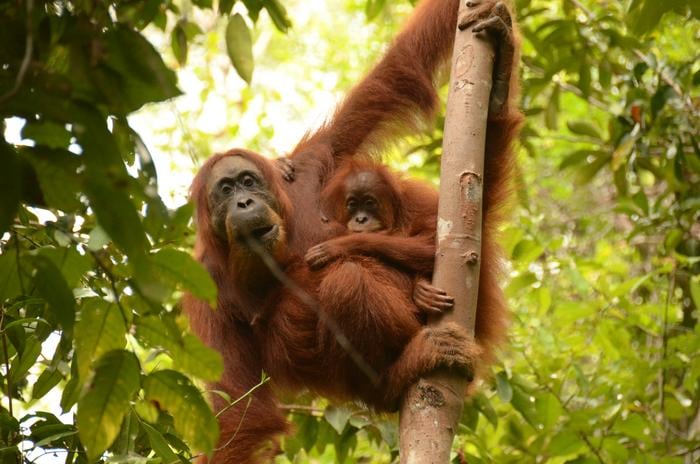Not all orangutan mothers parent alike, according to pioneering research that tracked wild Sumatran orangutans for 15 years. The study, published Tuesday in Proceedings of the Royal Society B, documents for the first time how individual orangutan mothers consistently differ in their parenting approaches—even with different offspring.
Researchers from the Max Planck Institute of Animal Behavior analyzed over 6,000 hours of observations covering 22 mother-infant pairs in Indonesia’s Suaq Balimbing research site. They discovered clear, individual differences in maternal behaviors that persisted across different infants and various environmental conditions.
“Our study shows that Sumatran orangutan mothers are not all the same when it comes to parenting behaviors,” said Revathe Thillaikumar, the study’s lead author and postdoctoral researcher at the Max Planck Institute of Animal Behavior. “For example, we found that during the developmental period, some mothers consistently carried their infants more than others, while some terminated body contact more frequently than others.”
The research team focused on six key maternal behaviors: initiating body contact, terminating body contact, initiating close proximity, terminating close proximity, carrying, and feeding nearby their infants. These behaviors significantly impact how infants learn crucial survival skills and navigate the rainforest canopy.
Beyond Environmental Factors
What makes the findings particularly significant is that these differences remained consistent even after accounting for numerous variables known to affect parenting behavior—such as infant age, sex, food availability, and social conditions.
“What was especially interesting is that these differences stayed consistent across the different infants of a mother, even when we accounted for factors known to affect maternal behavior,” Thillaikumar noted.
Sumatran orangutans have the longest infant dependency period of any non-human animal, with mothers providing care for 6-9 years. This extended dependency makes them an ideal species for studying maternal behavior variations.
The researchers found that mothers not only differed in their baseline parenting behaviors but also in how they adjusted their parenting as their infants matured.
“We found that mothers made flexible adjustments to their parenting behaviors and that they consistently differed from one another in how they made these adjustments,” Thillaikumar explained. “For example, while all mothers tended to terminate spatial proximity more frequently as their infants grew older, some mothers consistently did so more than others across all their offspring.”
Maternal Personalities in Non-Human Primates
The research team suggests these consistent differences might indicate individual maternal personalities in orangutans—adding to growing evidence that personality traits extend beyond humans to other species.
Caroline Schuppli, group leader at the Max Planck Institute and senior author of the study, emphasized the significance of their findings: “The consistent differences among mothers—both in the extent of their behaviors and in how these behaviors changed over the course of infant development—suggest that orangutans may possess individual maternal personalities.”
The statistical approach used in the study was particularly rigorous, accounting for various factors that might otherwise explain behavioral differences. The researchers carefully isolated true individual differences from other variables, ensuring their conclusions about maternal behavioral patterns were sound.
Interestingly, mothers who showed higher than average carrying behavior showed significantly less feeding in close proximity with their offspring. This suggests that greater early-life investment in carrying might lead to faster feeding skill acquisition, resulting in less need for close proximity feeding later in development.
Future Research Directions
The discovery opens new avenues for understanding how maternal behaviors might influence long-term developmental outcomes in offspring. However, answering these questions will require additional years of observation.
“We do not yet know whether differences in maternal behaviors bring about differences in aspects of infant development. Due to the many years that orangutans take to develop, we need at least a decade more to accumulate the data needed to investigate the effect of these differences on infant development,” Schuppli said.
The study also raises intriguing questions about the evolutionary origins of parenting styles. Consistent differences in maternal behavior could potentially have fitness consequences, affecting how quickly offspring reach developmental milestones and their future reproductive success.
With Sumatran orangutans critically endangered, understanding the nuances of their maternal behavior takes on additional significance for conservation efforts. As their habitat continues to shrink, insights into the complexity of their social development and parenting patterns may help inform protection strategies for this vulnerable species.
Discover more from Wild Science
Subscribe to get the latest posts sent to your email.

